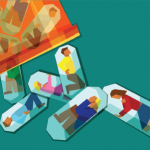(Reuters Health)—Mental health problems, like anxiety and depression, may partly explain why people with rheumatoid arthritis have an increased risk of cardiovascular disease, according to a new study.
Researchers linked anger, anxiety, depressive symptoms, job stress and low social support to increasing risk of hardening of the arteries, or atherosclerosis, for people with rheumatoid arthritis (RA).
Treating psychosocial problems may help ease arthritis symptoms, as well as decrease the risk of death from cardiovascular disease, the study team concludes in the journal Arthritis Care and Research.
Unlike osteoarthritis, which is mostly associated with wear-and-tear on joints with age, rheumatoid arthritis is an autoimmune disease that can strike at any point in life. The body’s immune system starts attacking the joints, causing swelling and pain. People with RA also tend to have increased inflammation.
The inflammation is most evident in the joints but is present “systemically” in many parts of the body, Dr. Peter Ganz told Reuters Health by email.
Inflammation is also a key component of atherosclerosis, from its beginning to its ultimate consequences, like heart attack and stroke, said Dr. Ganz, chief of cardiology at San Francisco General Hospital, who was not involved in the study.
When someone has both conditions, he said, the RA intensifies the inflammatory processes in the arteries, making the plaques worsen more rapidly and raising the risk of heart attacks, strokes and other complications.
Psychosocial stresses also increase inflammation, he said.
“So now you might have a triple whammy—inflammation from atherosclerosis, RA and psychosocial stresses all converge in the same patient,” Ganz said.
For the new study, Dr. Jon T. Giles of Columbia University College of Physicians & Surgeons in New York City and colleagues compared 195 patients with RA and no history of heart problems to more than 1,000 similar adults without arthritis.
Compared to the non-arthritis group, those with RA had more depressive symptoms, higher personal health stress, higher job stress and lower relationship stress. RA patients tended to have less anger than the comparison group.
In the RA group, higher anxiety scores, anger scores, more symptoms of depression, and stress due to caring for a loved one were associated with increased odds of coronary artery calcium. There was no relation between these psychosocial factors and artery calcium in the comparison group.
For people with RA, job stress also increased the risk of plaque in the carotid artery in the neck, which helps supply blood to the brain.

